Detailed Analysis of Emerging Trends in HR Management Practices
VerifiedAdded on 2021/05/30
|9
|2966
|167
Report
AI Summary
This report provides a comprehensive analysis of current trends in HR management, examining key challenges such as globalization, technological advancements, workforce diversity, and changes in management practices. It explores the impacts of these trends on employee culture, engagement, and overall organizational operations. The report delves into specific issues like employee retention, leadership development, and the need for organizations and HR professionals to adapt to a changing business environment. It highlights the importance of addressing globalization's impact, embracing technological advancements, and developing strategies to retain qualified employees. The report also emphasizes the need for HR departments to possess specific capabilities to support workers in the contemporary business setting, including data management, training, and communication strategies. It concludes by emphasizing the need for HR professionals to adapt and strategize proactively to meet the evolving demands of the modern workplace. This report is a valuable resource for students seeking to understand the complexities of HR management and is available on Desklib, a platform offering AI-based study tools.
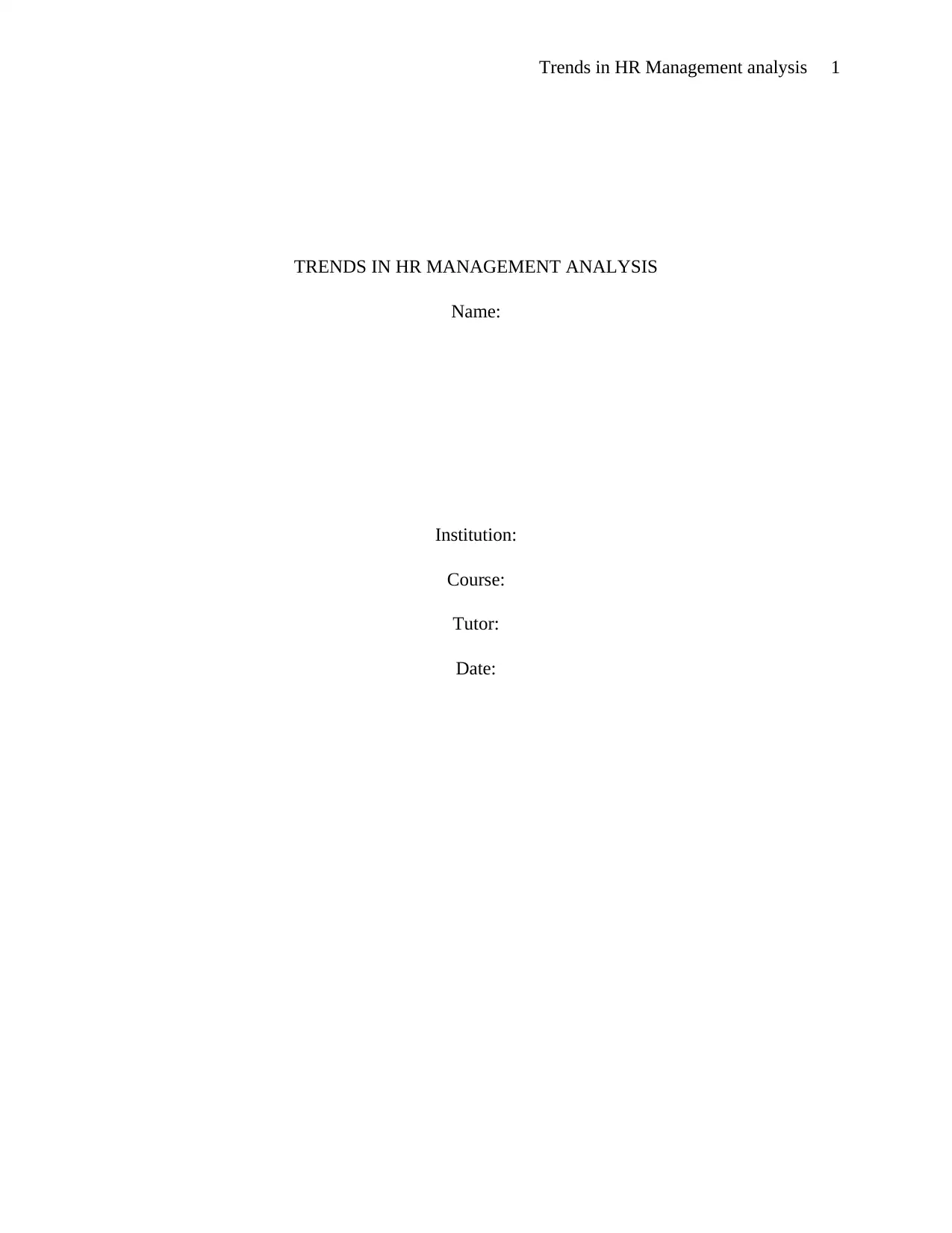
Trends in HR Management analysis 1
TRENDS IN HR MANAGEMENT ANALYSIS
Name:
Institution:
Course:
Tutor:
Date:
TRENDS IN HR MANAGEMENT ANALYSIS
Name:
Institution:
Course:
Tutor:
Date:
Paraphrase This Document
Need a fresh take? Get an instant paraphrase of this document with our AI Paraphraser
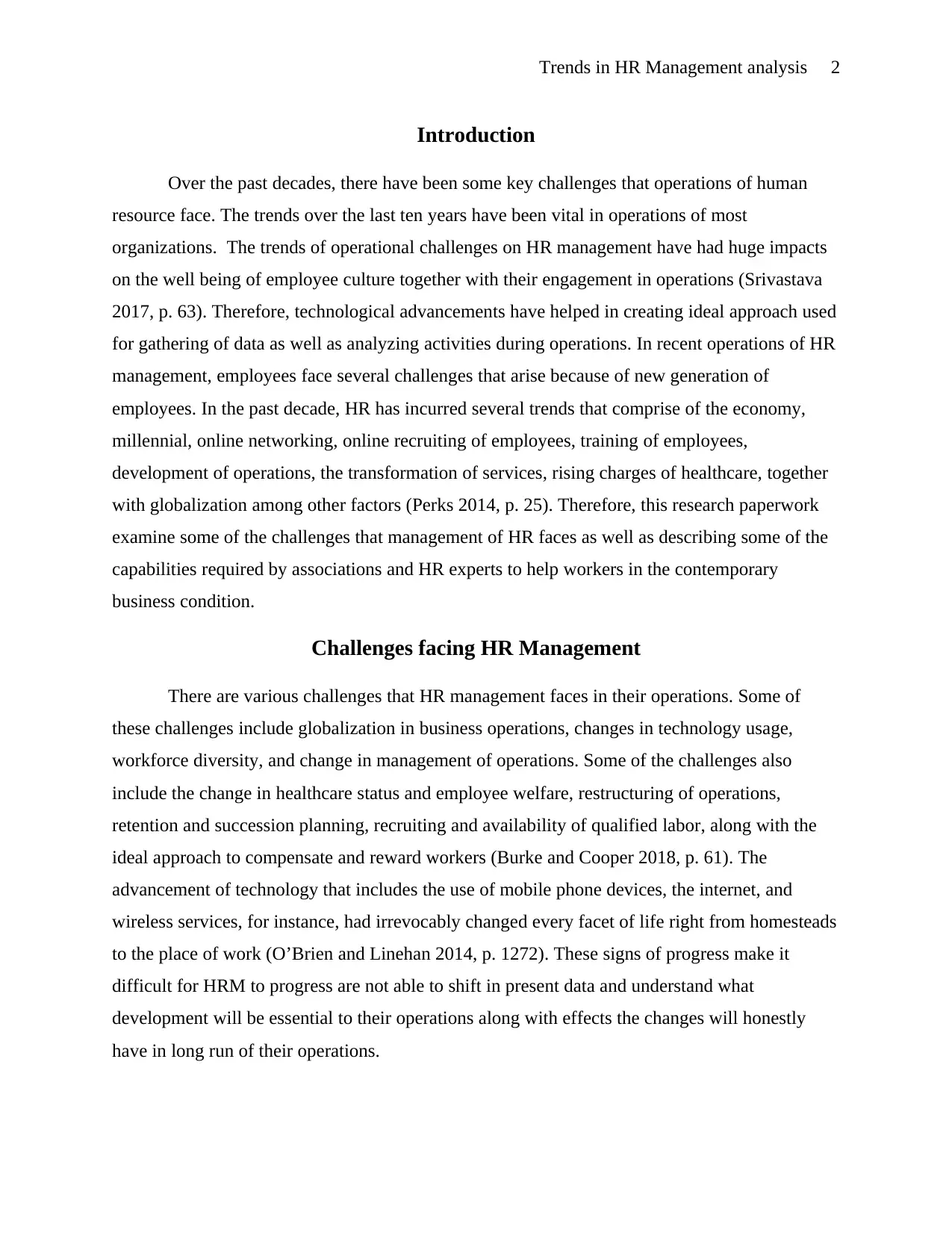
Trends in HR Management analysis 2
Introduction
Over the past decades, there have been some key challenges that operations of human
resource face. The trends over the last ten years have been vital in operations of most
organizations. The trends of operational challenges on HR management have had huge impacts
on the well being of employee culture together with their engagement in operations (Srivastava
2017, p. 63). Therefore, technological advancements have helped in creating ideal approach used
for gathering of data as well as analyzing activities during operations. In recent operations of HR
management, employees face several challenges that arise because of new generation of
employees. In the past decade, HR has incurred several trends that comprise of the economy,
millennial, online networking, online recruiting of employees, training of employees,
development of operations, the transformation of services, rising charges of healthcare, together
with globalization among other factors (Perks 2014, p. 25). Therefore, this research paperwork
examine some of the challenges that management of HR faces as well as describing some of the
capabilities required by associations and HR experts to help workers in the contemporary
business condition.
Challenges facing HR Management
There are various challenges that HR management faces in their operations. Some of
these challenges include globalization in business operations, changes in technology usage,
workforce diversity, and change in management of operations. Some of the challenges also
include the change in healthcare status and employee welfare, restructuring of operations,
retention and succession planning, recruiting and availability of qualified labor, along with the
ideal approach to compensate and reward workers (Burke and Cooper 2018, p. 61). The
advancement of technology that includes the use of mobile phone devices, the internet, and
wireless services, for instance, had irrevocably changed every facet of life right from homesteads
to the place of work (O’Brien and Linehan 2014, p. 1272). These signs of progress make it
difficult for HRM to progress are not able to shift in present data and understand what
development will be essential to their operations along with effects the changes will honestly
have in long run of their operations.
Introduction
Over the past decades, there have been some key challenges that operations of human
resource face. The trends over the last ten years have been vital in operations of most
organizations. The trends of operational challenges on HR management have had huge impacts
on the well being of employee culture together with their engagement in operations (Srivastava
2017, p. 63). Therefore, technological advancements have helped in creating ideal approach used
for gathering of data as well as analyzing activities during operations. In recent operations of HR
management, employees face several challenges that arise because of new generation of
employees. In the past decade, HR has incurred several trends that comprise of the economy,
millennial, online networking, online recruiting of employees, training of employees,
development of operations, the transformation of services, rising charges of healthcare, together
with globalization among other factors (Perks 2014, p. 25). Therefore, this research paperwork
examine some of the challenges that management of HR faces as well as describing some of the
capabilities required by associations and HR experts to help workers in the contemporary
business condition.
Challenges facing HR Management
There are various challenges that HR management faces in their operations. Some of
these challenges include globalization in business operations, changes in technology usage,
workforce diversity, and change in management of operations. Some of the challenges also
include the change in healthcare status and employee welfare, restructuring of operations,
retention and succession planning, recruiting and availability of qualified labor, along with the
ideal approach to compensate and reward workers (Burke and Cooper 2018, p. 61). The
advancement of technology that includes the use of mobile phone devices, the internet, and
wireless services, for instance, had irrevocably changed every facet of life right from homesteads
to the place of work (O’Brien and Linehan 2014, p. 1272). These signs of progress make it
difficult for HRM to progress are not able to shift in present data and understand what
development will be essential to their operations along with effects the changes will honestly
have in long run of their operations.
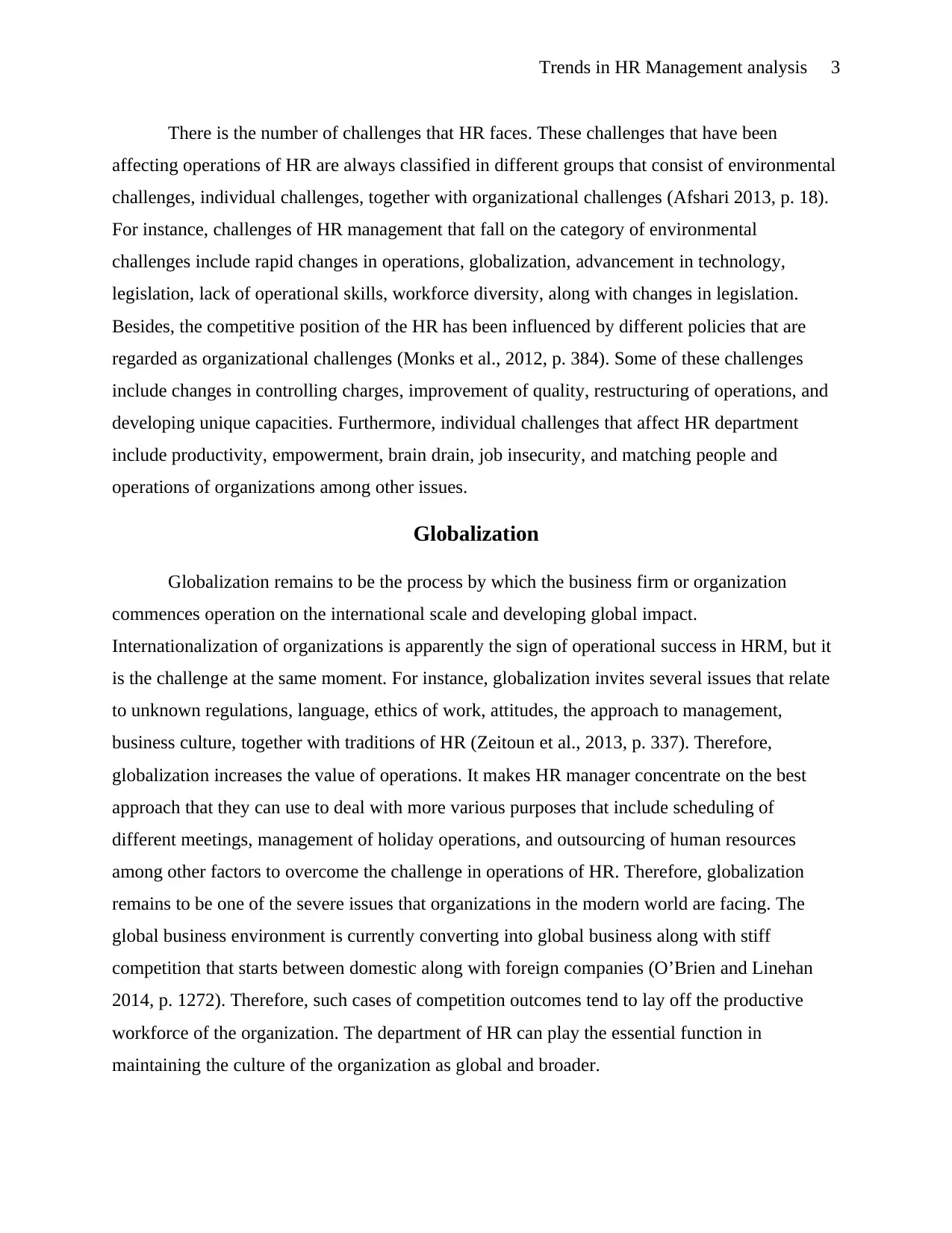
Trends in HR Management analysis 3
There is the number of challenges that HR faces. These challenges that have been
affecting operations of HR are always classified in different groups that consist of environmental
challenges, individual challenges, together with organizational challenges (Afshari 2013, p. 18).
For instance, challenges of HR management that fall on the category of environmental
challenges include rapid changes in operations, globalization, advancement in technology,
legislation, lack of operational skills, workforce diversity, along with changes in legislation.
Besides, the competitive position of the HR has been influenced by different policies that are
regarded as organizational challenges (Monks et al., 2012, p. 384). Some of these challenges
include changes in controlling charges, improvement of quality, restructuring of operations, and
developing unique capacities. Furthermore, individual challenges that affect HR department
include productivity, empowerment, brain drain, job insecurity, and matching people and
operations of organizations among other issues.
Globalization
Globalization remains to be the process by which the business firm or organization
commences operation on the international scale and developing global impact.
Internationalization of organizations is apparently the sign of operational success in HRM, but it
is the challenge at the same moment. For instance, globalization invites several issues that relate
to unknown regulations, language, ethics of work, attitudes, the approach to management,
business culture, together with traditions of HR (Zeitoun et al., 2013, p. 337). Therefore,
globalization increases the value of operations. It makes HR manager concentrate on the best
approach that they can use to deal with more various purposes that include scheduling of
different meetings, management of holiday operations, and outsourcing of human resources
among other factors to overcome the challenge in operations of HR. Therefore, globalization
remains to be one of the severe issues that organizations in the modern world are facing. The
global business environment is currently converting into global business along with stiff
competition that starts between domestic along with foreign companies (O’Brien and Linehan
2014, p. 1272). Therefore, such cases of competition outcomes tend to lay off the productive
workforce of the organization. The department of HR can play the essential function in
maintaining the culture of the organization as global and broader.
There is the number of challenges that HR faces. These challenges that have been
affecting operations of HR are always classified in different groups that consist of environmental
challenges, individual challenges, together with organizational challenges (Afshari 2013, p. 18).
For instance, challenges of HR management that fall on the category of environmental
challenges include rapid changes in operations, globalization, advancement in technology,
legislation, lack of operational skills, workforce diversity, along with changes in legislation.
Besides, the competitive position of the HR has been influenced by different policies that are
regarded as organizational challenges (Monks et al., 2012, p. 384). Some of these challenges
include changes in controlling charges, improvement of quality, restructuring of operations, and
developing unique capacities. Furthermore, individual challenges that affect HR department
include productivity, empowerment, brain drain, job insecurity, and matching people and
operations of organizations among other issues.
Globalization
Globalization remains to be the process by which the business firm or organization
commences operation on the international scale and developing global impact.
Internationalization of organizations is apparently the sign of operational success in HRM, but it
is the challenge at the same moment. For instance, globalization invites several issues that relate
to unknown regulations, language, ethics of work, attitudes, the approach to management,
business culture, together with traditions of HR (Zeitoun et al., 2013, p. 337). Therefore,
globalization increases the value of operations. It makes HR manager concentrate on the best
approach that they can use to deal with more various purposes that include scheduling of
different meetings, management of holiday operations, and outsourcing of human resources
among other factors to overcome the challenge in operations of HR. Therefore, globalization
remains to be one of the severe issues that organizations in the modern world are facing. The
global business environment is currently converting into global business along with stiff
competition that starts between domestic along with foreign companies (O’Brien and Linehan
2014, p. 1272). Therefore, such cases of competition outcomes tend to lay off the productive
workforce of the organization. The department of HR can play the essential function in
maintaining the culture of the organization as global and broader.
⊘ This is a preview!⊘
Do you want full access?
Subscribe today to unlock all pages.

Trusted by 1+ million students worldwide
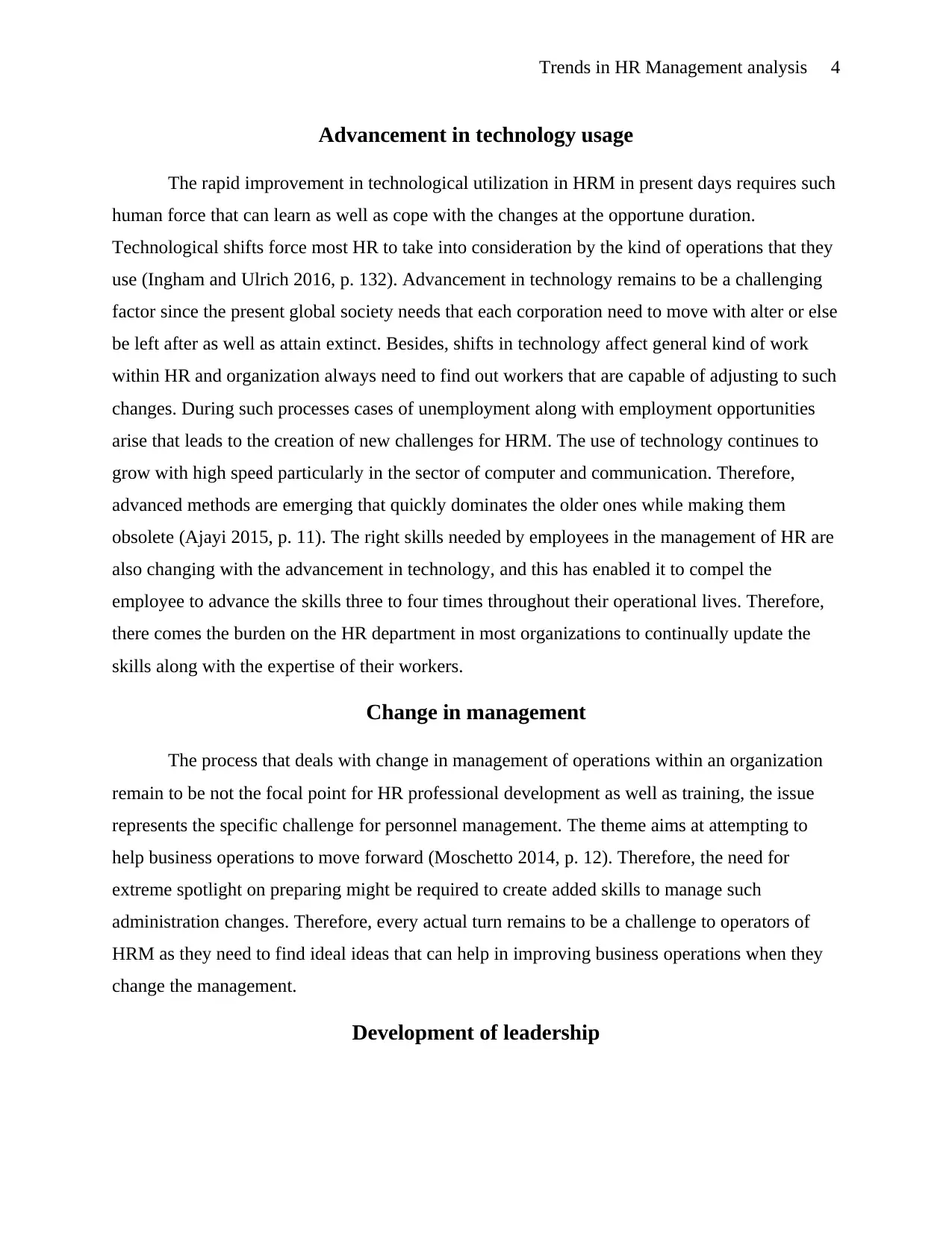
Trends in HR Management analysis 4
Advancement in technology usage
The rapid improvement in technological utilization in HRM in present days requires such
human force that can learn as well as cope with the changes at the opportune duration.
Technological shifts force most HR to take into consideration by the kind of operations that they
use (Ingham and Ulrich 2016, p. 132). Advancement in technology remains to be a challenging
factor since the present global society needs that each corporation need to move with alter or else
be left after as well as attain extinct. Besides, shifts in technology affect general kind of work
within HR and organization always need to find out workers that are capable of adjusting to such
changes. During such processes cases of unemployment along with employment opportunities
arise that leads to the creation of new challenges for HRM. The use of technology continues to
grow with high speed particularly in the sector of computer and communication. Therefore,
advanced methods are emerging that quickly dominates the older ones while making them
obsolete (Ajayi 2015, p. 11). The right skills needed by employees in the management of HR are
also changing with the advancement in technology, and this has enabled it to compel the
employee to advance the skills three to four times throughout their operational lives. Therefore,
there comes the burden on the HR department in most organizations to continually update the
skills along with the expertise of their workers.
Change in management
The process that deals with change in management of operations within an organization
remain to be not the focal point for HR professional development as well as training, the issue
represents the specific challenge for personnel management. The theme aims at attempting to
help business operations to move forward (Moschetto 2014, p. 12). Therefore, the need for
extreme spotlight on preparing might be required to create added skills to manage such
administration changes. Therefore, every actual turn remains to be a challenge to operators of
HRM as they need to find ideal ideas that can help in improving business operations when they
change the management.
Development of leadership
Advancement in technology usage
The rapid improvement in technological utilization in HRM in present days requires such
human force that can learn as well as cope with the changes at the opportune duration.
Technological shifts force most HR to take into consideration by the kind of operations that they
use (Ingham and Ulrich 2016, p. 132). Advancement in technology remains to be a challenging
factor since the present global society needs that each corporation need to move with alter or else
be left after as well as attain extinct. Besides, shifts in technology affect general kind of work
within HR and organization always need to find out workers that are capable of adjusting to such
changes. During such processes cases of unemployment along with employment opportunities
arise that leads to the creation of new challenges for HRM. The use of technology continues to
grow with high speed particularly in the sector of computer and communication. Therefore,
advanced methods are emerging that quickly dominates the older ones while making them
obsolete (Ajayi 2015, p. 11). The right skills needed by employees in the management of HR are
also changing with the advancement in technology, and this has enabled it to compel the
employee to advance the skills three to four times throughout their operational lives. Therefore,
there comes the burden on the HR department in most organizations to continually update the
skills along with the expertise of their workers.
Change in management
The process that deals with change in management of operations within an organization
remain to be not the focal point for HR professional development as well as training, the issue
represents the specific challenge for personnel management. The theme aims at attempting to
help business operations to move forward (Moschetto 2014, p. 12). Therefore, the need for
extreme spotlight on preparing might be required to create added skills to manage such
administration changes. Therefore, every actual turn remains to be a challenge to operators of
HRM as they need to find ideal ideas that can help in improving business operations when they
change the management.
Development of leadership
Paraphrase This Document
Need a fresh take? Get an instant paraphrase of this document with our AI Paraphraser
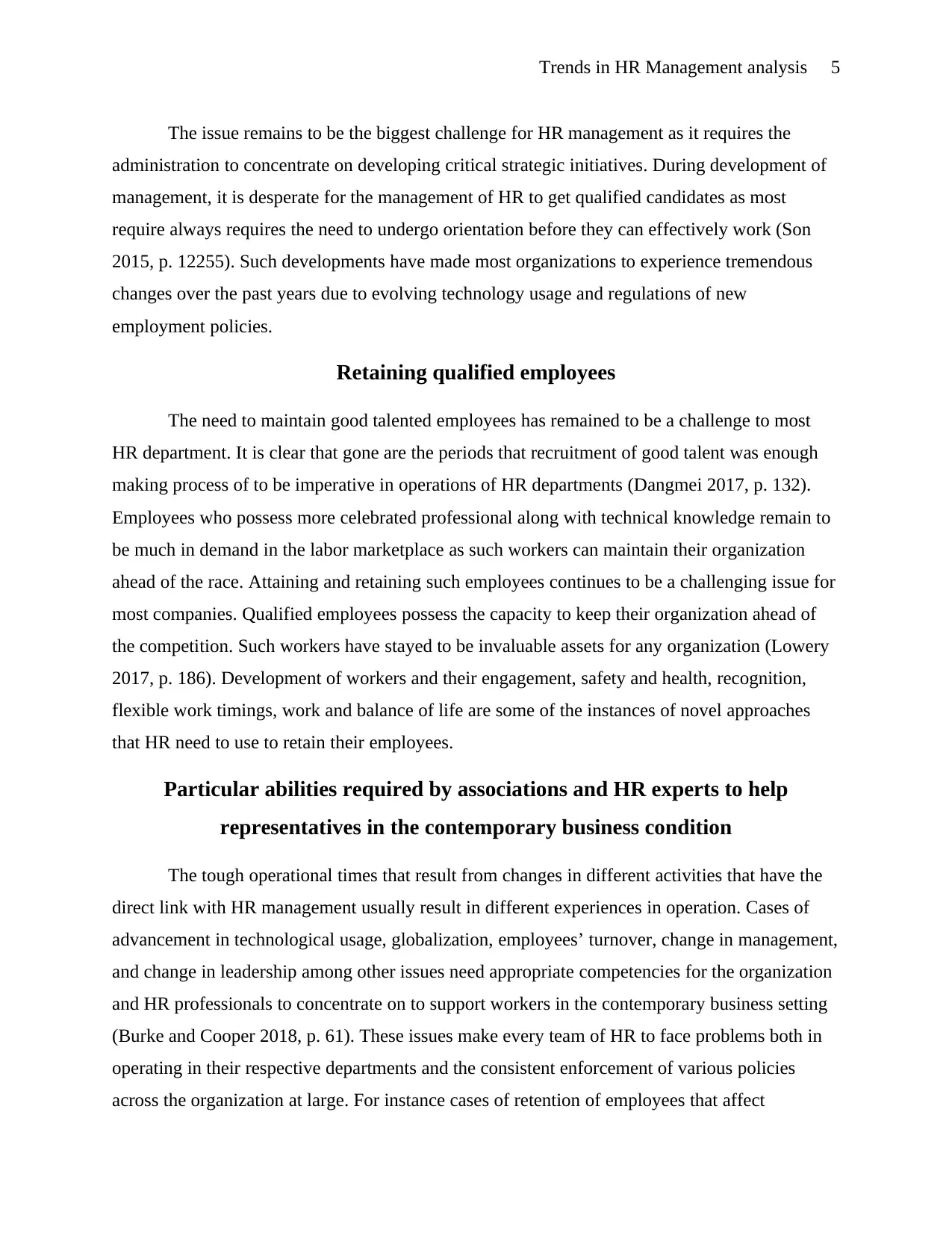
Trends in HR Management analysis 5
The issue remains to be the biggest challenge for HR management as it requires the
administration to concentrate on developing critical strategic initiatives. During development of
management, it is desperate for the management of HR to get qualified candidates as most
require always requires the need to undergo orientation before they can effectively work (Son
2015, p. 12255). Such developments have made most organizations to experience tremendous
changes over the past years due to evolving technology usage and regulations of new
employment policies.
Retaining qualified employees
The need to maintain good talented employees has remained to be a challenge to most
HR department. It is clear that gone are the periods that recruitment of good talent was enough
making process of to be imperative in operations of HR departments (Dangmei 2017, p. 132).
Employees who possess more celebrated professional along with technical knowledge remain to
be much in demand in the labor marketplace as such workers can maintain their organization
ahead of the race. Attaining and retaining such employees continues to be a challenging issue for
most companies. Qualified employees possess the capacity to keep their organization ahead of
the competition. Such workers have stayed to be invaluable assets for any organization (Lowery
2017, p. 186). Development of workers and their engagement, safety and health, recognition,
flexible work timings, work and balance of life are some of the instances of novel approaches
that HR need to use to retain their employees.
Particular abilities required by associations and HR experts to help
representatives in the contemporary business condition
The tough operational times that result from changes in different activities that have the
direct link with HR management usually result in different experiences in operation. Cases of
advancement in technological usage, globalization, employees’ turnover, change in management,
and change in leadership among other issues need appropriate competencies for the organization
and HR professionals to concentrate on to support workers in the contemporary business setting
(Burke and Cooper 2018, p. 61). These issues make every team of HR to face problems both in
operating in their respective departments and the consistent enforcement of various policies
across the organization at large. For instance cases of retention of employees that affect
The issue remains to be the biggest challenge for HR management as it requires the
administration to concentrate on developing critical strategic initiatives. During development of
management, it is desperate for the management of HR to get qualified candidates as most
require always requires the need to undergo orientation before they can effectively work (Son
2015, p. 12255). Such developments have made most organizations to experience tremendous
changes over the past years due to evolving technology usage and regulations of new
employment policies.
Retaining qualified employees
The need to maintain good talented employees has remained to be a challenge to most
HR department. It is clear that gone are the periods that recruitment of good talent was enough
making process of to be imperative in operations of HR departments (Dangmei 2017, p. 132).
Employees who possess more celebrated professional along with technical knowledge remain to
be much in demand in the labor marketplace as such workers can maintain their organization
ahead of the race. Attaining and retaining such employees continues to be a challenging issue for
most companies. Qualified employees possess the capacity to keep their organization ahead of
the competition. Such workers have stayed to be invaluable assets for any organization (Lowery
2017, p. 186). Development of workers and their engagement, safety and health, recognition,
flexible work timings, work and balance of life are some of the instances of novel approaches
that HR need to use to retain their employees.
Particular abilities required by associations and HR experts to help
representatives in the contemporary business condition
The tough operational times that result from changes in different activities that have the
direct link with HR management usually result in different experiences in operation. Cases of
advancement in technological usage, globalization, employees’ turnover, change in management,
and change in leadership among other issues need appropriate competencies for the organization
and HR professionals to concentrate on to support workers in the contemporary business setting
(Burke and Cooper 2018, p. 61). These issues make every team of HR to face problems both in
operating in their respective departments and the consistent enforcement of various policies
across the organization at large. For instance cases of retention of employees that affect
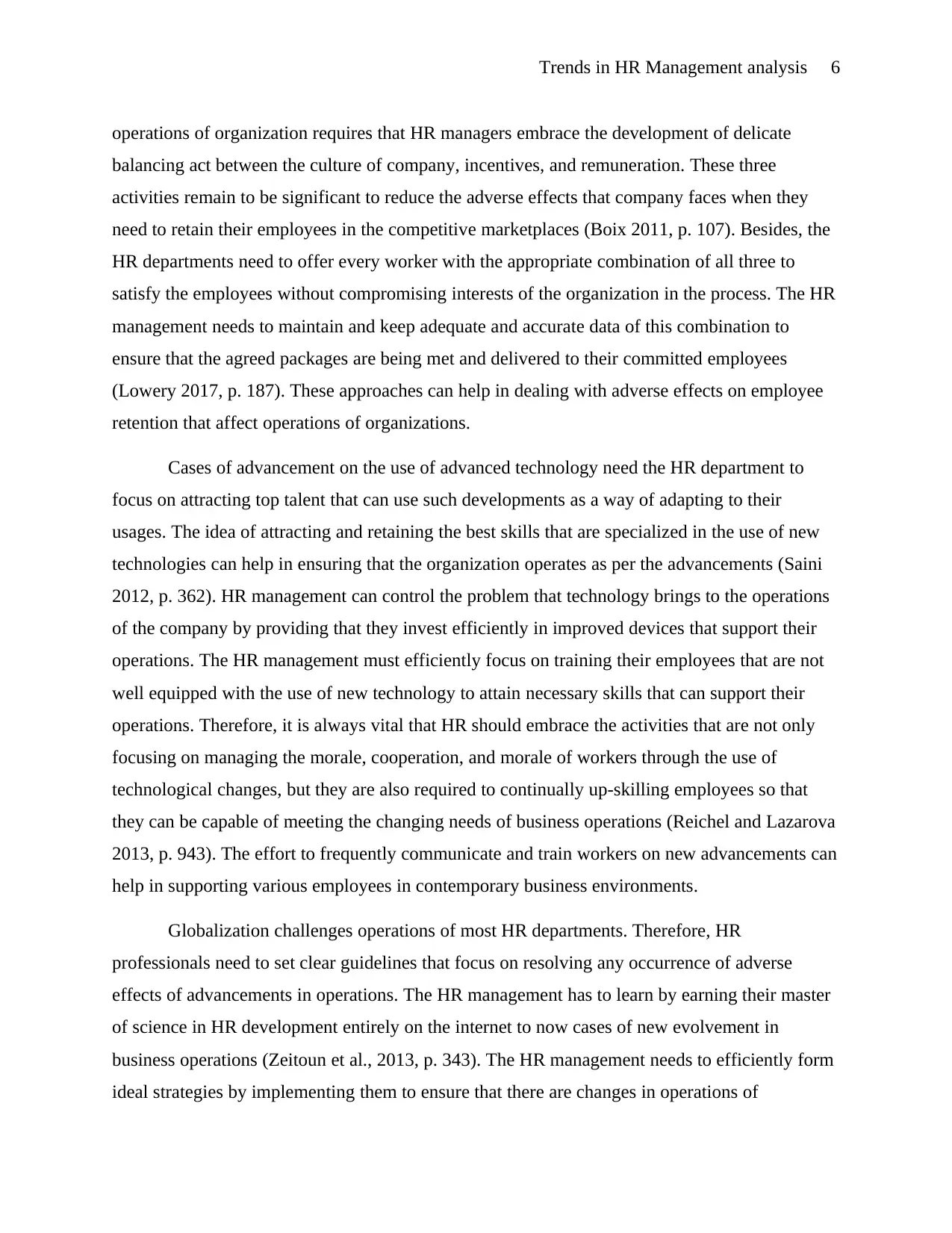
Trends in HR Management analysis 6
operations of organization requires that HR managers embrace the development of delicate
balancing act between the culture of company, incentives, and remuneration. These three
activities remain to be significant to reduce the adverse effects that company faces when they
need to retain their employees in the competitive marketplaces (Boix 2011, p. 107). Besides, the
HR departments need to offer every worker with the appropriate combination of all three to
satisfy the employees without compromising interests of the organization in the process. The HR
management needs to maintain and keep adequate and accurate data of this combination to
ensure that the agreed packages are being met and delivered to their committed employees
(Lowery 2017, p. 187). These approaches can help in dealing with adverse effects on employee
retention that affect operations of organizations.
Cases of advancement on the use of advanced technology need the HR department to
focus on attracting top talent that can use such developments as a way of adapting to their
usages. The idea of attracting and retaining the best skills that are specialized in the use of new
technologies can help in ensuring that the organization operates as per the advancements (Saini
2012, p. 362). HR management can control the problem that technology brings to the operations
of the company by providing that they invest efficiently in improved devices that support their
operations. The HR management must efficiently focus on training their employees that are not
well equipped with the use of new technology to attain necessary skills that can support their
operations. Therefore, it is always vital that HR should embrace the activities that are not only
focusing on managing the morale, cooperation, and morale of workers through the use of
technological changes, but they are also required to continually up-skilling employees so that
they can be capable of meeting the changing needs of business operations (Reichel and Lazarova
2013, p. 943). The effort to frequently communicate and train workers on new advancements can
help in supporting various employees in contemporary business environments.
Globalization challenges operations of most HR departments. Therefore, HR
professionals need to set clear guidelines that focus on resolving any occurrence of adverse
effects of advancements in operations. The HR management has to learn by earning their master
of science in HR development entirely on the internet to now cases of new evolvement in
business operations (Zeitoun et al., 2013, p. 343). The HR management needs to efficiently form
ideal strategies by implementing them to ensure that there are changes in operations of
operations of organization requires that HR managers embrace the development of delicate
balancing act between the culture of company, incentives, and remuneration. These three
activities remain to be significant to reduce the adverse effects that company faces when they
need to retain their employees in the competitive marketplaces (Boix 2011, p. 107). Besides, the
HR departments need to offer every worker with the appropriate combination of all three to
satisfy the employees without compromising interests of the organization in the process. The HR
management needs to maintain and keep adequate and accurate data of this combination to
ensure that the agreed packages are being met and delivered to their committed employees
(Lowery 2017, p. 187). These approaches can help in dealing with adverse effects on employee
retention that affect operations of organizations.
Cases of advancement on the use of advanced technology need the HR department to
focus on attracting top talent that can use such developments as a way of adapting to their
usages. The idea of attracting and retaining the best skills that are specialized in the use of new
technologies can help in ensuring that the organization operates as per the advancements (Saini
2012, p. 362). HR management can control the problem that technology brings to the operations
of the company by providing that they invest efficiently in improved devices that support their
operations. The HR management must efficiently focus on training their employees that are not
well equipped with the use of new technology to attain necessary skills that can support their
operations. Therefore, it is always vital that HR should embrace the activities that are not only
focusing on managing the morale, cooperation, and morale of workers through the use of
technological changes, but they are also required to continually up-skilling employees so that
they can be capable of meeting the changing needs of business operations (Reichel and Lazarova
2013, p. 943). The effort to frequently communicate and train workers on new advancements can
help in supporting various employees in contemporary business environments.
Globalization challenges operations of most HR departments. Therefore, HR
professionals need to set clear guidelines that focus on resolving any occurrence of adverse
effects of advancements in operations. The HR management has to learn by earning their master
of science in HR development entirely on the internet to now cases of new evolvement in
business operations (Zeitoun et al., 2013, p. 343). The HR management needs to efficiently form
ideal strategies by implementing them to ensure that there are changes in operations of
⊘ This is a preview!⊘
Do you want full access?
Subscribe today to unlock all pages.

Trusted by 1+ million students worldwide
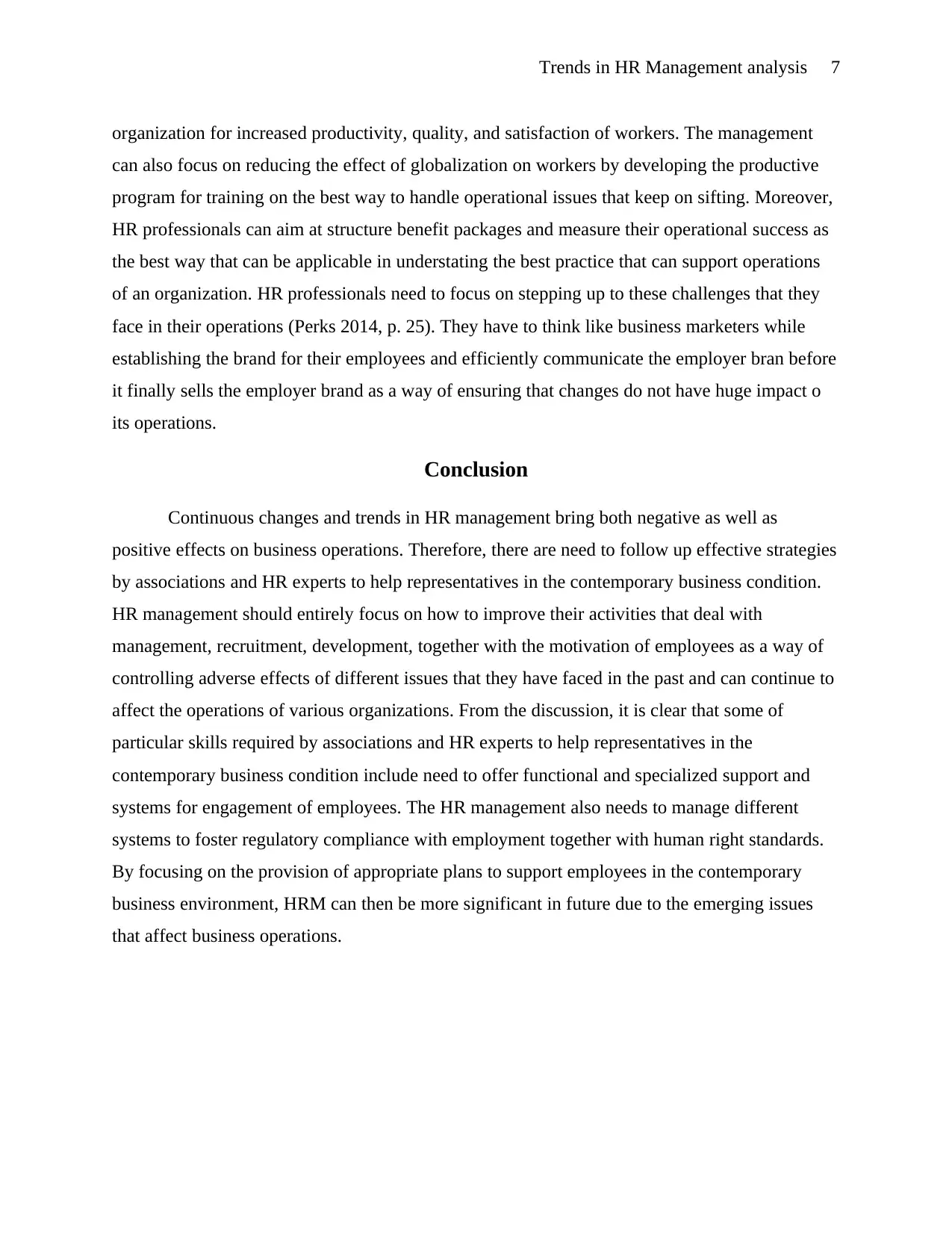
Trends in HR Management analysis 7
organization for increased productivity, quality, and satisfaction of workers. The management
can also focus on reducing the effect of globalization on workers by developing the productive
program for training on the best way to handle operational issues that keep on sifting. Moreover,
HR professionals can aim at structure benefit packages and measure their operational success as
the best way that can be applicable in understating the best practice that can support operations
of an organization. HR professionals need to focus on stepping up to these challenges that they
face in their operations (Perks 2014, p. 25). They have to think like business marketers while
establishing the brand for their employees and efficiently communicate the employer bran before
it finally sells the employer brand as a way of ensuring that changes do not have huge impact o
its operations.
Conclusion
Continuous changes and trends in HR management bring both negative as well as
positive effects on business operations. Therefore, there are need to follow up effective strategies
by associations and HR experts to help representatives in the contemporary business condition.
HR management should entirely focus on how to improve their activities that deal with
management, recruitment, development, together with the motivation of employees as a way of
controlling adverse effects of different issues that they have faced in the past and can continue to
affect the operations of various organizations. From the discussion, it is clear that some of
particular skills required by associations and HR experts to help representatives in the
contemporary business condition include need to offer functional and specialized support and
systems for engagement of employees. The HR management also needs to manage different
systems to foster regulatory compliance with employment together with human right standards.
By focusing on the provision of appropriate plans to support employees in the contemporary
business environment, HRM can then be more significant in future due to the emerging issues
that affect business operations.
organization for increased productivity, quality, and satisfaction of workers. The management
can also focus on reducing the effect of globalization on workers by developing the productive
program for training on the best way to handle operational issues that keep on sifting. Moreover,
HR professionals can aim at structure benefit packages and measure their operational success as
the best way that can be applicable in understating the best practice that can support operations
of an organization. HR professionals need to focus on stepping up to these challenges that they
face in their operations (Perks 2014, p. 25). They have to think like business marketers while
establishing the brand for their employees and efficiently communicate the employer bran before
it finally sells the employer brand as a way of ensuring that changes do not have huge impact o
its operations.
Conclusion
Continuous changes and trends in HR management bring both negative as well as
positive effects on business operations. Therefore, there are need to follow up effective strategies
by associations and HR experts to help representatives in the contemporary business condition.
HR management should entirely focus on how to improve their activities that deal with
management, recruitment, development, together with the motivation of employees as a way of
controlling adverse effects of different issues that they have faced in the past and can continue to
affect the operations of various organizations. From the discussion, it is clear that some of
particular skills required by associations and HR experts to help representatives in the
contemporary business condition include need to offer functional and specialized support and
systems for engagement of employees. The HR management also needs to manage different
systems to foster regulatory compliance with employment together with human right standards.
By focusing on the provision of appropriate plans to support employees in the contemporary
business environment, HRM can then be more significant in future due to the emerging issues
that affect business operations.
Paraphrase This Document
Need a fresh take? Get an instant paraphrase of this document with our AI Paraphraser
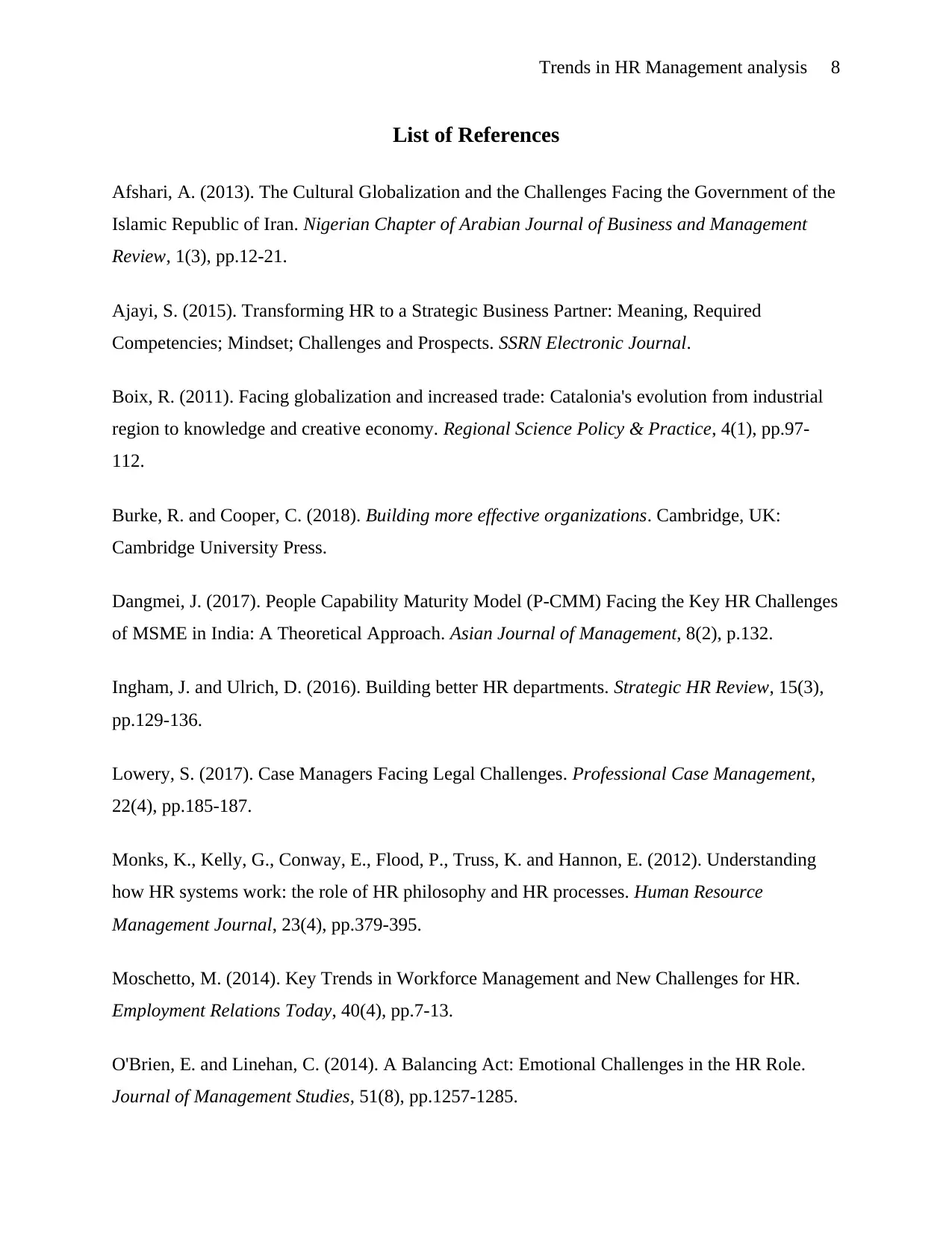
Trends in HR Management analysis 8
List of References
Afshari, A. (2013). The Cultural Globalization and the Challenges Facing the Government of the
Islamic Republic of Iran. Nigerian Chapter of Arabian Journal of Business and Management
Review, 1(3), pp.12-21.
Ajayi, S. (2015). Transforming HR to a Strategic Business Partner: Meaning, Required
Competencies; Mindset; Challenges and Prospects. SSRN Electronic Journal.
Boix, R. (2011). Facing globalization and increased trade: Catalonia's evolution from industrial
region to knowledge and creative economy. Regional Science Policy & Practice, 4(1), pp.97-
112.
Burke, R. and Cooper, C. (2018). Building more effective organizations. Cambridge, UK:
Cambridge University Press.
Dangmei, J. (2017). People Capability Maturity Model (P-CMM) Facing the Key HR Challenges
of MSME in India: A Theoretical Approach. Asian Journal of Management, 8(2), p.132.
Ingham, J. and Ulrich, D. (2016). Building better HR departments. Strategic HR Review, 15(3),
pp.129-136.
Lowery, S. (2017). Case Managers Facing Legal Challenges. Professional Case Management,
22(4), pp.185-187.
Monks, K., Kelly, G., Conway, E., Flood, P., Truss, K. and Hannon, E. (2012). Understanding
how HR systems work: the role of HR philosophy and HR processes. Human Resource
Management Journal, 23(4), pp.379-395.
Moschetto, M. (2014). Key Trends in Workforce Management and New Challenges for HR.
Employment Relations Today, 40(4), pp.7-13.
O'Brien, E. and Linehan, C. (2014). A Balancing Act: Emotional Challenges in the HR Role.
Journal of Management Studies, 51(8), pp.1257-1285.
List of References
Afshari, A. (2013). The Cultural Globalization and the Challenges Facing the Government of the
Islamic Republic of Iran. Nigerian Chapter of Arabian Journal of Business and Management
Review, 1(3), pp.12-21.
Ajayi, S. (2015). Transforming HR to a Strategic Business Partner: Meaning, Required
Competencies; Mindset; Challenges and Prospects. SSRN Electronic Journal.
Boix, R. (2011). Facing globalization and increased trade: Catalonia's evolution from industrial
region to knowledge and creative economy. Regional Science Policy & Practice, 4(1), pp.97-
112.
Burke, R. and Cooper, C. (2018). Building more effective organizations. Cambridge, UK:
Cambridge University Press.
Dangmei, J. (2017). People Capability Maturity Model (P-CMM) Facing the Key HR Challenges
of MSME in India: A Theoretical Approach. Asian Journal of Management, 8(2), p.132.
Ingham, J. and Ulrich, D. (2016). Building better HR departments. Strategic HR Review, 15(3),
pp.129-136.
Lowery, S. (2017). Case Managers Facing Legal Challenges. Professional Case Management,
22(4), pp.185-187.
Monks, K., Kelly, G., Conway, E., Flood, P., Truss, K. and Hannon, E. (2012). Understanding
how HR systems work: the role of HR philosophy and HR processes. Human Resource
Management Journal, 23(4), pp.379-395.
Moschetto, M. (2014). Key Trends in Workforce Management and New Challenges for HR.
Employment Relations Today, 40(4), pp.7-13.
O'Brien, E. and Linehan, C. (2014). A Balancing Act: Emotional Challenges in the HR Role.
Journal of Management Studies, 51(8), pp.1257-1285.
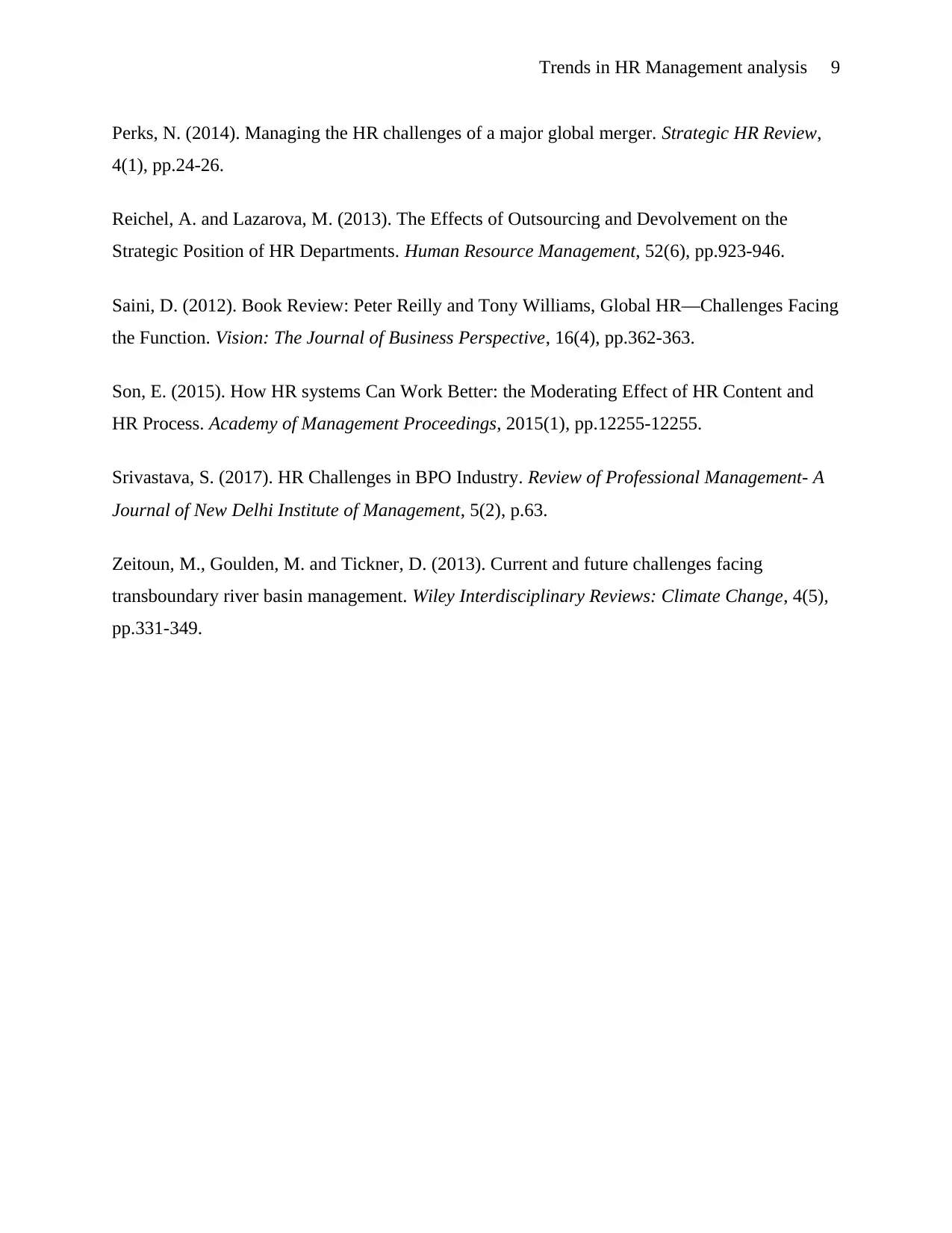
Trends in HR Management analysis 9
Perks, N. (2014). Managing the HR challenges of a major global merger. Strategic HR Review,
4(1), pp.24-26.
Reichel, A. and Lazarova, M. (2013). The Effects of Outsourcing and Devolvement on the
Strategic Position of HR Departments. Human Resource Management, 52(6), pp.923-946.
Saini, D. (2012). Book Review: Peter Reilly and Tony Williams, Global HR—Challenges Facing
the Function. Vision: The Journal of Business Perspective, 16(4), pp.362-363.
Son, E. (2015). How HR systems Can Work Better: the Moderating Effect of HR Content and
HR Process. Academy of Management Proceedings, 2015(1), pp.12255-12255.
Srivastava, S. (2017). HR Challenges in BPO Industry. Review of Professional Management- A
Journal of New Delhi Institute of Management, 5(2), p.63.
Zeitoun, M., Goulden, M. and Tickner, D. (2013). Current and future challenges facing
transboundary river basin management. Wiley Interdisciplinary Reviews: Climate Change, 4(5),
pp.331-349.
Perks, N. (2014). Managing the HR challenges of a major global merger. Strategic HR Review,
4(1), pp.24-26.
Reichel, A. and Lazarova, M. (2013). The Effects of Outsourcing and Devolvement on the
Strategic Position of HR Departments. Human Resource Management, 52(6), pp.923-946.
Saini, D. (2012). Book Review: Peter Reilly and Tony Williams, Global HR—Challenges Facing
the Function. Vision: The Journal of Business Perspective, 16(4), pp.362-363.
Son, E. (2015). How HR systems Can Work Better: the Moderating Effect of HR Content and
HR Process. Academy of Management Proceedings, 2015(1), pp.12255-12255.
Srivastava, S. (2017). HR Challenges in BPO Industry. Review of Professional Management- A
Journal of New Delhi Institute of Management, 5(2), p.63.
Zeitoun, M., Goulden, M. and Tickner, D. (2013). Current and future challenges facing
transboundary river basin management. Wiley Interdisciplinary Reviews: Climate Change, 4(5),
pp.331-349.
⊘ This is a preview!⊘
Do you want full access?
Subscribe today to unlock all pages.

Trusted by 1+ million students worldwide
1 out of 9
Related Documents
Your All-in-One AI-Powered Toolkit for Academic Success.
+13062052269
info@desklib.com
Available 24*7 on WhatsApp / Email
![[object Object]](/_next/static/media/star-bottom.7253800d.svg)
Unlock your academic potential
Copyright © 2020–2026 A2Z Services. All Rights Reserved. Developed and managed by ZUCOL.





